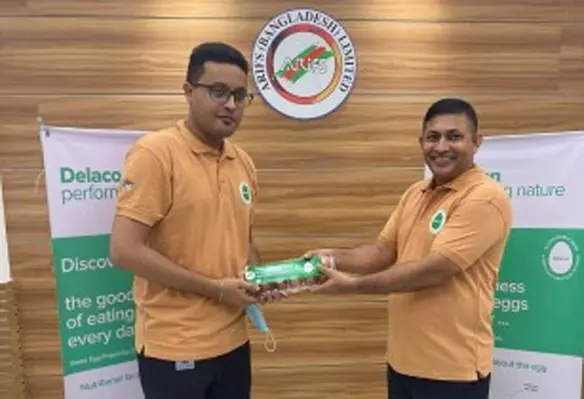Delacon Biotechnik, a multinational feed additive company headquartered in Linz, Austria celebrated World Egg Day on 8 October through the companys "Green Egg Campaign” with an aim to educate masses about sustainable egg consumption
Delacon said that the initiative's primary goals are to focus on consumer awareness of eggs as a precious protein source, strengthen the local egg-laying industry, and increase egg consumption. After the conclusion of this campaign in Asia, Delacon has tried to expand its reach to a global level by distributing eggs and organising educational events in collaboration with the Bethesda Children's Village Social and Educational Center in Brazil and local distributor Arifs Ltd. in Bangladesh.
According to the company, with a constant global population rise, the demand for nutritious food and protein is high. In addition, according to the Brazilian Association of Animal Protein, egg consumption significantly increased in 2020, directly correlated to the recession triggered by the pandemic. The company believes that with the growing demand, producers seek safe and sustainable animal production. The importance of natural alternatives such as phytogenics has increased significantly as they improve feed conversion, increase laying rate, enhance egg quality, and reduce the carbon footprint. Delacon says that based on years of research data, the industry is getting more aware of the high impact animal nutrition has on egg quality and on the environment.
Educating about the benefits of eggs on a global level
Delacon collaborated with the Bethesda Children's Village Social and Educational Center in preparation for World Egg Day. Delacon's regional technical manager Maria Luiza Ruiz and sales group lead Latin America, Roberto Montanhini Neto, organised educational activities. Dr Maike Maziero was invited to talk about the benefits of consuming eggs and the production process, as well as their different structural components. In addition, more than 1,000 eggs were given to the students as a part of the programme.
Roberto Montanhini Neto said, "We care about future generations and feel delighted to be part of the development of future generations because it is from them that the new production and consumption habits will be designed."
Due to the Covid-19 restrictions in place in Bangladesh, Delacon collaborated this year with local distributor Arifs. The programme included the distribution of eggs to the local families as Delacon aims at pursuing its goal of raising awareness about the health benefits of this nutritious protein source.





